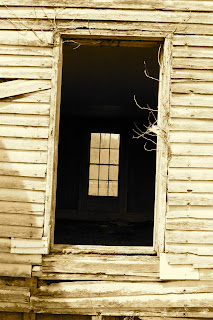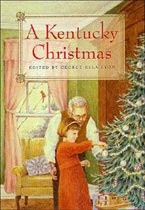
I used to be a more spontaneous person. And then I had a child. And then I married a man who likes a plan (generally). And then I had two more children. And then I got rather broody and
nesty, where I didn't want to stray too far from home. I'm not complaining. I wouldn't have it any other way and yet, all the while I've had this innate wanderlust: an armchair travel sense of "what's beyond the rainbow? what's through the dell?" It's not so much a romantic spirit or a greener pastures kind of thing, more of a "what's behind door number 3?" But wait! I also wanted to see what was behind doors number 1 and 2. Like many people today, I want it all at once.

Well, I know what you're thinking: didn't this woman just move 1,100 miles across the country from her familiar to a land where she knew no one? Isn't that like opening doors 1-3 all at the same time? Yes, and that hasn't been without its
complications, it's string-tugging and
introspection and periodic
bewilderment. It has also brought a great deal of joy and wonder and shear jumping up and down, too. [Pandora and I would have gotten along famously. "Let's see what
Carol Merrill has behind Door Number TWO!"] But now that I'm here and settled and refiguring what is meant by "home place," I'm redefining the concept of home, too, and what is it that I want from my home (and family) and what do I want to give back to it (and them)? Same thing with the rest of my life: what's next?
Occasionally along the journey I've lost that zest–you know, that lust for life that hits you when you wake up in the morning and say,
mm, what will I do today? Oh, I think I'll go in a direction I've never been, to boldly go where no (
wo)man has gone before, but only after I do ten loads of laundry, plan dinner, and run three miles (no, not really). It's not that bad but sometimes I am overcome by focus–or lack thereof–and if I plan too far ahead, well, then I can easily derail myself. At the same time, I often run from a whim or a possibility because I feel I won't live up to
the expectations of others, or I get stage fright, or I think I'd rather be at home puttering in circles like a whirling dervish (and in a home that is not always ready for company). Around and around she goes. [But a fully stocked, well-planned pantry, that I do have...well, sort of: it's in several locations right now. Don't ask.]

It goes without saying that I can drive people nuts or be considered
inconsiderate. I frequently apologize to the people in my life. I'm a good
idea person–an idea starter with the best intentions but my follow through, well, let's just say a lot of balls get dropped. When I'm writing, it's a different thing altogether. I focus, I do well on deadline, I want to make it all work. I tune out the clatter. I periodically bake or cook something familiar–or new–to help refocus again.

You might say that this woman needs a life, a job, a purpose. Well, part of midlife, midway, so to speak, and being a few months away from my "late forties" is that I'm finding new purposes. My boys are needing me less, or so it seems, and my daughter is off in the world. I've had a "mini empty nest" experience in the past year: both with my daughter being on her own and with my own nest-shaking and relocation. I am settling well at last but it has been a journey and will continue to be one. I've never been a joiner type of person but rather a loner who likes to socialize on occasion but with comfortable small groups of diverse friends or individual friends. I "play well with others" but I crave solitude, too. That's just how I've always rolled.
As I've become older I've grown more comfortable with girlfriends, as I have with my own uniqueness. I have always enjoyed talking with intelligent, interesting men and listening to their ideas,
philosophies and thoughts on life–
appreciating their usual candor and ability to cut through the cow poop. Yet I often misunderstand the nuances and niceties of other women. Perhaps my newly found candor and authenticity can be off-putting at times. We, as women, tend to dance around each other while men just cut right to the chase. In another life I'm convinced that I ran a literary salon where ideas were discussed as freely and openly as the absinthe was poured. And I'm sure I smoked a lot. Either that or I was a Shaker in a very egalitarian society and did a lot of canning.
Yesterday my friend Teresa sent me a musing that a woman, Pam Young, posted recently on
FlyLady. In her "Young at Heart" essay she spoke of dealing with our inner child in our forties and trying to tame her:
We have the ability now to get to know our little child within us. We have neglected that child for a long time. Like any child they are going to get your attention one way or another. We have let her run wild in the streets with our credit cards. She has neglected to clean her room and to eat good foods. She stays up way too late and doesn't get enough sleep! This makes her cranky. Oh and she spends way too much time on the computer and doesn't get enough exercise. Do you know anyone who would allow her children to do this? So why do you allow yourself to do this?

Exactly:
Why? But why, also, do we punish ourselves so severely or allow ourselves to be held up to what society says we should be or how we should look or how our houses should appear inside? Teresa has recently become an advocate of the website
Operation Beautiful which advocates a form of stealth Post-Its in all the right places–notes of positive reinforcement, a form of paying it forward in the nicest possible way. Think Stuart Smalley on
Saturday Night Live, played by Al Franken before he was the (finally) elected Senator from Minnesota (yay, Al!), saying to himself in the mirror: "I'm good enough, I'm smart enough and doggone it...people like me." Only you see it on a Post-It, in different expressions and on bathroom mirrors–and other public places–or where you least expect to see them.
This past year I've realized that not only should a mother give herself oxygen first lest the entire enterprise fall to the Earth (my friend Edie calls this "the choose yourself first" mantra, which isn't as selfish as it sounds), but that home is not only where the heart is but where we are. I don't like to reduce life to a greeting card (but hey, it's a blog), but sometimes that
reductionist thinking is really that simple. Several from Mary
Engelbreit are constant reminders to me: "No matter where you go, there you are," also "Bloom where you are planted" and “If you don't like something change it; if you can't change it, change the way you think about it.” [That is also the core mantra of Buddhist mindfulness as well as
DBT or
dialectical behavior therapy.]

We can't always change our
(sometimes difficult) circumstances or the minds of (sometimes difficult) people, we can only change our reactions and
interactions with those
circumstances and people. Above all, we have the power to change ourselves or our behaviors. That I am doing: with a lot of
introspection, honesty, new purpose and direction. And a very patient family who lives with me (and who love me for who I am). In the process I am peeling back, and peeling off, the layers. It is both frightening and liberating.

In
The Wizard of Oz–ironically on
TCM tonight and that we watched for the
bazillionth time–Good Witch
Glinda instructs Dorothy that the power to get home has been there all along, within herself and in her own back yard. It's such a simple sentiment and yet so powerful:
Dorothy asks Glinda, the Good Witch, "Oh, will you help me? Can you help me?"
"You don't need to be helped any longer," A smiling Glinda answers. "You've always had the power to go back to Kansas."
"I have?"
"Then why didn't you tell her before?" Scarecrow demands.
"Because she wouldn't have believed me. She had to learn it for herself."
The Tin Man leans forward and asks, "What have you learned, Dorothy?"
"Well, I . . . I think that is . . . that it wasn't enough just to want to see Uncle Henry and Auntie Em . . . and that if I ever go looking for my heart's desire again, I won't look any further than my own backyard; because if it isn't here, I never really lost it to begin with."
In Andrew Johnson's pitch-perfect essay on The Spirituality of Oz–The Meaning of the Movie on the Theosophical Society in America's website, he writes that this is what Dorothy learned:
-
We have the power. We have Ruby Red slippers to transport us to Kansas, to bring about the Edenic state, or to create our heart's desire.
-
Witches and cyclones, while bad, can be a means for spiritual growth.
We must learn for ourselves. Truth is not given so much as it is realized. Look within. You do not have to go off in search of a mystic or seek truth from a variety of exotic religions. Truth is found in your own back yard.
-
Reality is very simple. We create our own reality. We tend to make it more complicated than it need be. The simple universal fact is that, if we believe it to be so, it is.
There's no place like home. The kingdom of heaven is not a place; but a condition.
Reprint from Quest 88 (November-December 2000): 213-7.
The poet and writer Maya Angelou said,
"It is this belief in a power larger than myself and other than myself which allows me to venture into the unknown and even the unknowable." It is a great thing to be comfortable in our own back yard and in "the temple of our familiar," as Alice Walker wrote about, but sometimes it is good to wander a bit outside of it, away from the garden gate and the apron strings. To enjoy a new world and realm–to select a journey, but to sometimes depart from it, too. To always find the way home again after a series of dead-ends, new roads, new horizons. To savor the unexpected as my friend
Teresa and I did, today, in a town called
Midway, Kentucky. It was a very unplanned, spontaneous visit (the date determined a few days ago and our destination and itinerary were only decided this morning at 10am), and we hadn't seen each other in over six months. It was a great journey and I only spent the gas money (thanks Teresa for lunch!). [Photos and travelogue to follow soon.]



















































